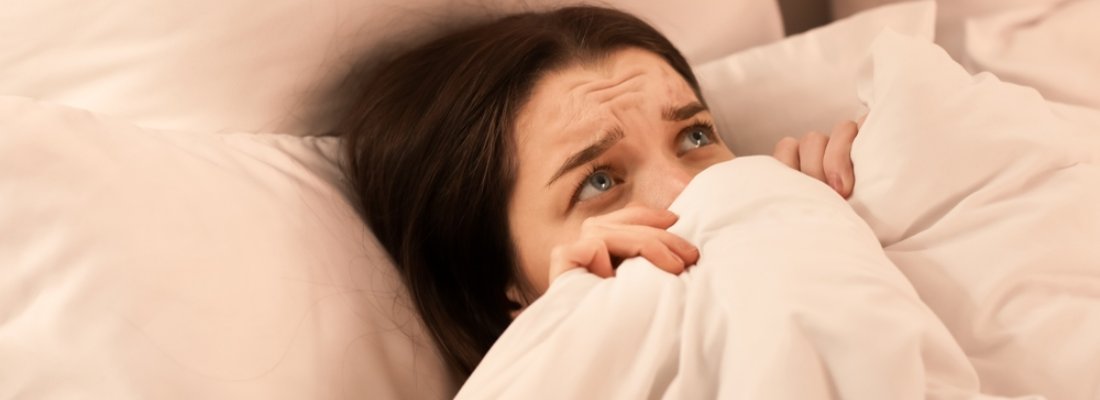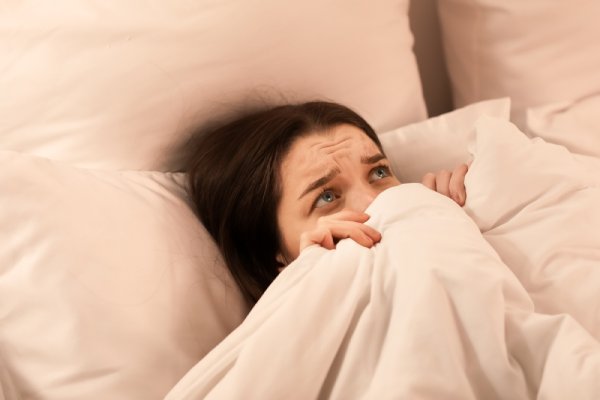
You might have heard about phobias. People feel fear of clowns, spiders, heights, etc. You might be surprised but around 12% of adults suffer from phobias at some point.
Some phobias might be intense and impact the daily activities of a person. Let us introduce you to the fear of falling asleep called somniphobia. People with this condition may experience extreme anxiety and fear of falling asleep and it may have lasting impacts. So, let’s explore what this condition is and what are the symptoms and other vital parameters.
What Is Somniphobia-Fear of Sleep
This condition is an irrational and overwhelming fear of sleep. Unlike insomnia, which involves trouble falling or staying asleep, it arises from anxiety about the act of sleeping itself or what may happen during sleep.
People with this condition may fear losing control, experiencing nightmares, or encountering harm while asleep. This fear of sleep often results in avoidance behaviors, such as staying awake for extended periods, relying on stimulants, or engaging in distracting activities to delay bedtime. If this condition is left unaddressed, it can impact physical health, mental clarity, and overall well-being.
Somniphobia is a special type of phobia. Extreme anxieties linked with certain things, circumstances, or creatures are known as specific phobias. The majority of people who suffer from certain phobias are aware that their worry is excessive in comparison to the real danger the fear represents. Nevertheless, controlling the symptoms of anxiety can be challenging.
How Common is Somniphobia?
Although a rough estimate, around 40 million adults in the US suffer from this condition. However, around 12% of US adults have a specific phobia which is twice in frequency in women than in men.
Is Somniphobia Dangerous?
Yes, it can be dangerous if you do not keep a check and balance. Sleep is essential for the body to repair itself, regulate emotions, and maintain optimal cognitive function. Chronic sleep deprivation due to this condition can lead to:
- Physical Health Issues: Weakened immunity, increased risk of heart disease, and hormonal imbalances.
- Mental Health Decline: Heightened anxiety, depression, and impaired decision-making.
- Cognitive Impairment: Reduced focus, memory problems, and slower reaction times.
In severe cases, it may also contribute to accidents, as lack of sleep impairs judgment and alertness.
Symptoms of Somniphobia
It manifests through physical, emotional, and behavioral symptoms:
- Physical Symptoms: Racing heart, shortness of breath, sweating, or trembling when thinking about sleep.
- Emotional Symptoms: Intense dread, panic attacks, or overwhelming anxiety as bedtime nears.
- Behavioral Symptoms: Avoiding bedtime, relying on stimulants, or engaging in activities to delay sleep.
These symptoms not only disrupt nightly rest but also have a cascading effect on overall health and daily functioning.
What Causes Somniphobia
The causes may vary, but they often arise from a combination of psychological and environmental factors.
Traumatic Experiences
Traumatic events during sleep, such as frequent nightmares, sleep paralysis, or waking up during a frightening incident, can trigger this condition. These experiences create an association between sleep and danger.
Anxiety Disorders
People with generalized anxiety, post-traumatic stress disorder (PTSD), or obsessive-compulsive disorder (OCD) are more likely to develop this condition. These conditions amplify fears, making it difficult to view sleep as a safe and restorative process.
Cultural and Media Influences
Stories, movies, or myths portraying sleep as dangerous can instill fear. Horror films that focus on sleep-related harm or cultural beliefs about spirits during sleep can contribute to this disorder.
Health Issues
Conditions such as sleep apnea, restless leg syndrome, or other sleep disturbances can create fear around the act of sleeping. People may worry about suffocating, experiencing discomfort, or not waking up.
How To Overcome Somniphobia?
Taking control of this disease requires a combination of self-help strategies and professional treatment.
Lifestyle Changes
- Establish a Bedtime Routine: Create a calming pre-sleep ritual, such as reading, meditating, or taking a warm bath.
- Limit Stimulants: Avoid caffeine, nicotine, and heavy meals before bed to reduce anxiety and promote relaxation.
- Exercise Regularly: Physical activity during the day can improve sleep quality and reduce overall stress.
Cognitive and Behavioral Techniques
- Cognitive Behavioral Therapy (CBT): CBT helps individuals challenge and reframe irrational fears about sleep. Therapists guide patients to develop healthier thought patterns.
- Exposure Therapy: Gradually exposing oneself to the idea of sleep in a controlled environment can help lessen fear. For instance, starting with short naps and building up to a full night’s rest.
Self-Help Practices
- Journaling: Writing down fears before bedtime can help process emotions and reduce anxiety.
- Relaxation Techniques: Deep breathing, progressive muscle relaxation, or listening to calming sounds can create a more peaceful mindset.
Professional Treatment Options
- Therapy: Professional therapists can tailor treatment plans to address the root causes.
- Medication: In severe cases, short-term use of anti-anxiety medication or sleep aids may be beneficial, but only under a doctor’s supervision.
- Holistic Methods: Yoga, mindfulness, and acupuncture can complement traditional treatments by promoting relaxation.
When implementing these strategies, consistency is the key. With time and effort, this condition can be effectively managed.
Living with Somniphobia: Supporting a Loved One
If someone you know is struggling with this condition, your understanding can make a major impact. Here’s how you can support them:
- Recognize the Signs: Be attentive to their struggles, such as avoiding bedtime or expressing sleep anxiety.
- Offer Emotional Support: Listen without judgment and encourage open communication.
- Encourage Professional Help: Suggest therapy or a consultation with a sleep specialist if their condition worsens.
Your patience and empathy can help them feel less alone and more confident in seeking help.
When Should You See a Doctor?
This condition can escalate into a severe issue if left untreated. It’s essential to seek professional help if:
- Sleep deprivation starts to affect physical and mental health.
- Sleep anxiety becomes overwhelming and constant.
- Coping strategies fail to reduce fear or improve sleep patterns.
Therapists, sleep clinics, and online support groups can provide valuable resources for managing somniphobia effectively.
Conclusion
To conclude, somniphobia, or the fear of sleep, is a condition that can disrupt every aspect of life if not addressed. Understanding what causes this condition, recognizing its symptoms, and exploring strategies to overcome it are vital steps toward recovery.
Additionally, Home Sleep Center is your trusted platform for a good night’s sleep. With telemedicine services and a team of experts, your sleep solutions are just a step away. Contact us today and get started.

